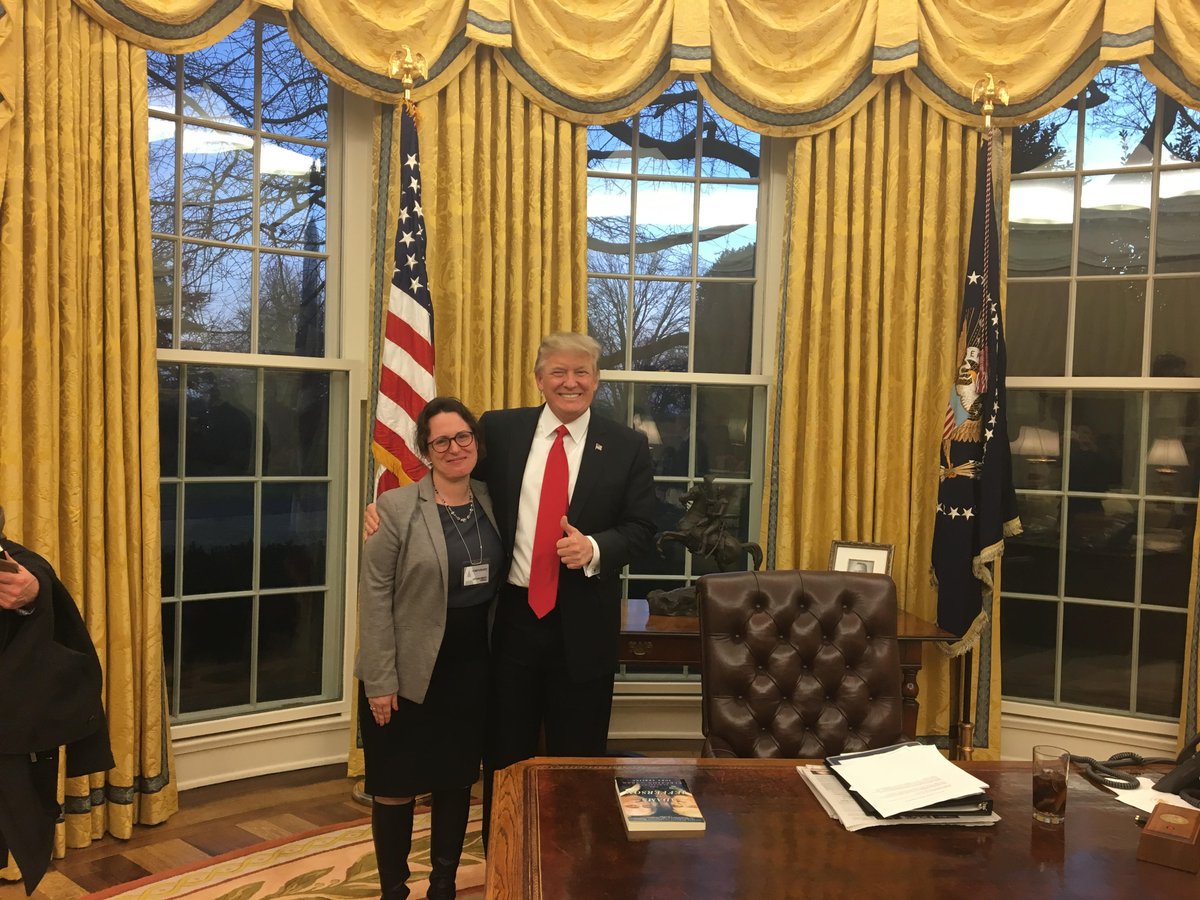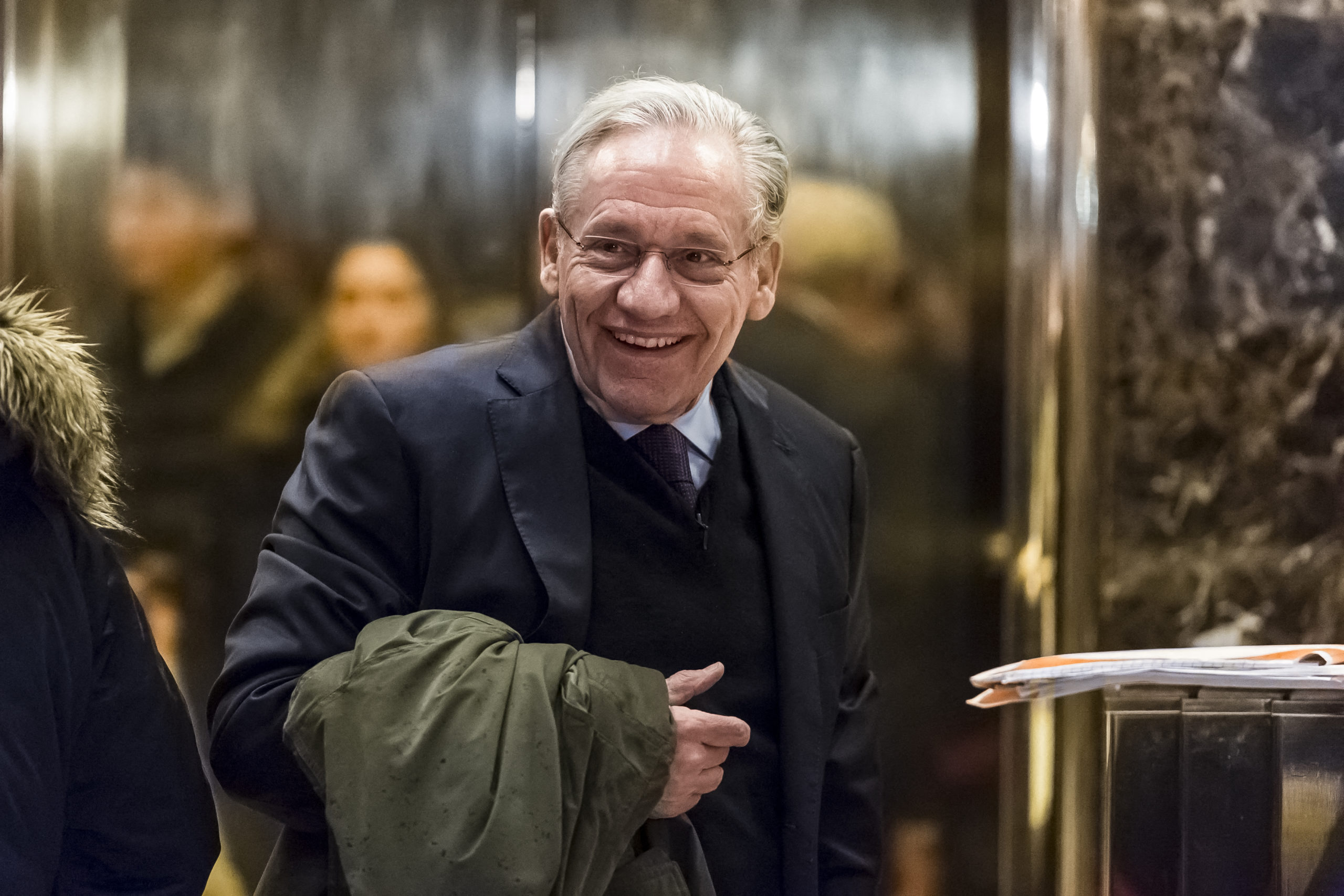Tantalizing bits of information were happily fed to the public in the days leading up to the release of “Confidence Man,” a meaty look at everything from Donald Trump’s upbringing to his presidency by New York Times reporter Maggie Haberman.
Many of the revelations were unsurprising, such as when Trump, the architect of the birtherism lie, suggested he wouldn’t use the same toilet as former President Barack Obama. Or when Haberman reveals that Trump may have impersonated a reporter on a call with Rep. Debbie Dingell after decades of reportedly assuming the alias “John Miller” to defend himself against bad press. Some revelations were deeply concerning, such as Trump giving Rudy Giuliani, the former mayor of New York and his personal attorney, the green light to “do anything” necessary to overturn the results of the 2020 election. Or when he warned that he would sue Congress for moving to impeach him.
But Haberman’s discovery that Trump did not intend to leave the White House after losing the 2020 election to Joe Biden were outright concerning. Haberman wrote that Trump, initially, seemed to understand that he had lost. Then he pivoted. In the weeks following the election, Trump began to tell aides that he wasn’t exiting the office.
“We’re never leaving,” Haberman reports Trump told an aide. “How can you leave when you won an election?”
Following the election, Trump dodged most journalists’ questions about his refusal to publicly acknowledge Biden’s win, only saying that he would leave the White House when the time came. Prior to a CNN report on Haberman’s book in September, it hadn’t been widely reported that Trump had made plain his intentions to refuse to cede power.
It’s unclear when Haberman obtained this information, but she’s said publicly that she began focusing on the book “in earnest” following the second impeachment trial in February 2021 once Trump was out of office. Still, the online fallout from the revelation that Haberman hadn’t gone to print with these reported comments from the president about the election as soon as possible — or at least during the aftermath of the Jan. 6 storming of the U.S. Capitol by Trump’s supporters — was swift and intense, as The Wrap noted. One commenter tweeted that Haberman could write any damning information about Trump for her employer “like a real journalist, not a PR agent or anti-democracy grifter.” Another alleged that she was profiting from the president’s alleged crimes, while a different tweeter sarcastically likened Haberman’s editorial decisions to declining to report a murder.
The pushback also raised a sticky question that has become more prevalent within journalism of late: When is it acceptable for journalists to withhold reporting in service of their book project, especially when that reporting is clearly of urgent public interest?

Maggie Haberman
ABC News reporter Jonathan Karl reported on a never before revealed memo sent to Vice President Mike Pence by Trump’s campaign attorney on how to overturn the election results in his 2021 book, “Betrayal: The Final Act of the Trump Show.” In another instance, Michael Bender released “Frankly, We Did Win This Election: The Inside Story of How Trump Lost” in the summer of 2021 when he was a reporter at The Wall Street Journal, detailing how Trump was working behind the scenes to undermine the previous year’s election results. Washington Post reporters Philip Rucker and Carol Leonnig were criticized when they began promoting their book, “I Alone Can Fix It,” revealing that top officials feared Trump was planning a coup and wondering if they could use the military to stop him.
Political reporters writing books that contain exciting, never-before-published information isn’t a new phenomenon. But the wave of books detailing the Trump administration’s routine abuses of power, which often presented real threats to human life during his tenure, has given new urgency to ethical questions around this dilemma.
All journalists and newsrooms contend with when to publish a story. Should it go live right now, or will other breaking news overshadow the reporting? Should the report be held longer to see if anything new develops? Is more in-depth reporting required to make better sense of this information?
And, most importantly, who benefits from holding the information back?
“If the answer is the reporter, the writer, the publishing house, or the news organization [benefits] from making it splashy, then I think you really have to have to weigh that,” says Allison Hantschel, author, freelance writer for Dame magazine, and co-publisher of the journalism and politics blog First Draft, who has written on this topic. “Who are you serving? That’s something that we’ve really lost in journalism is the idea of who you serve.”
Scoops that could benefit the public being used as commercial tools to generate sales have ramped up in recent years, in part due to the volume of misconduct by the Trump administration.
During the early days of the pandemic, in early February 2020, Trump said to reporter Bob Woodward, who was working on “Rage” at the time, “It goes through air, Bob. That’s always tougher than the touch. You know, the touch — you don’t have to touch things, right? But the air, you just breathe the air. That’s how it’s passed. And so that’s a very tricky one. That’s a very delicate one. It’s also more deadly than your — you know, your — even your strenuous flus.”
In the following weeks, Trump and his administration promoted a very different reality, riddled with constant reassurances that everything would be fine. On Feb. 25, Trump told the public that Covid-19 was “a problem that’s going to go away.” The next day, Trump said in a briefing that the coronavirus was “like a regular flu that we have flu shots for.” Then, on Feb. 27, he claimed that “like a miracle,” the coronavirus would one day “disappear.” This pattern of lies about the severity of the disease would continue throughout his presidency. And by the time Trump’s true understanding of the pandemic was publicized in September 2020, at least 200,000 Americans had died due to Covid-19.
Defenders of Woodward’s decision to hold off on publishing Trump’s Covid comments praised him for taking the time to flesh out the context around the information he had. At the same time, critics maintained that even a tiny chance the scoop could have saved lives was one worth taking. Part of Woodward’s response was that it took him until May 2020 to verify the scoop, which prompted more questions as to why the information wasn’t reported once it was pinned down. Another argument is that Woodward’s reporting wouldn’t have shifted public policy, since nothing about the administration’s response shifted once the news was broken. But that misses the point that some individuals would have changed their behaviors, regardless of whether policy shifted, if they knew the disease was deadlier than the seasonal flu.
Withholding critical information for books is a worrisome trend, says Samuel Freedman, a journalism professor at Columbia University and the author of nine books. “An individual author has to ask herself or himself: ‘How do I feel about having had information that potentially could have saved lives? And I didn’t disclose it because I wanted to wait till the book was ready to be published so I’d sell more copies.’”
“As a journalist, one would have to ask, ‘Who’s my loyalty toward?’ Is it myself and my book? Is it to my employer? … Or is it to the public?” — Dan Gillmor, professor at Arizona State University and co-founder of the ASU News Co/Lab
The societal consequences of withholding information depend on the book’s subject matter. One of the scenes from “The Final Days,” Carl Bernstein and Woodward’s book on the end of Richard Nixon’s presidency, pertained to the man’s drunkenness and how people around the former president were afraid for his wellbeing. But the difference is, Freedman says, when Bernstein and Woodward researched that book, Nixon wasn’t in office. Running to print information about him wouldn’t have altered the course of history. Their reporting during the Watergate scandal itself clarified Nixon’s wrongdoings and the White House’s cover-up, and their discoveries were published in The Washington Post at the time of the events, not months later in a book.
Media analysts interviewed for this story believe there is an ethical imperative to publish information in the public interest, including information that genuinely affects people’s health or national security or when a reporter has clear evidence that an official is lying about something significant. “We reported both of our books while on leave from The Post, conducting interviews with the agreement that they be used only for our books,” Leonnig and Rucker said in a joint statement to Nieman Reports. “When we came across information that we felt the public needed to know right away, we set forth to try to report that information in real-time for The Post. We stayed in regular contact with Post editors about our book project.” (Jonathan Karl declined to comment through an ABC spokesperson; Michael Bender, who is now at The New York Times, has not responded to a request for comment.)
One such instance of publishing in real time followed Trump’s phone call with Ukrainian president Volodymyr Zelensky.
“Phil and I felt we had information from our book reporting that shed new light on an unreported and newly-relevant pattern of Trump’s concerning conversations with foreign leaders,” said Leonnig over email. “Our sources agreed to our request to use the information for The Post’s news pages.”
There doesn’t appear to be an industry-wide consensus on this approach, though. BBC radio host Zeinab Badawi pressed Haberman about her decision not to report Trump’s intention to unlawfully remain in the White House, asking if she was valuing profits over journalistic principles, especially considering current Justice Department and congressional investigations into Trump’s attempts to interfere with the transfer of cede power.
“When I learn of information, and it’s confirmed and reportable, my goal is always to get it into publication as quickly as possible,” Haberman told Badawi. “I wanted to paint a fuller picture, and it’s a process of going back and revisiting scenes and interviewing sources, and that often reveals new information. People are willing to say things for history in books … and to reveal information that they are not for the daily report.” (Haberman did not respond to a request to comment from Nieman Reports.)
Following this backlash, The New York Times released a statement in support of Haberman, saying: “Maggie Haberman took leave from The Times to write her book. In the course of reporting the book, she shared considerable newsworthy information with The Times. Editors decided what news was best suited for our news report.”
This thinking aligns with that of Jonathan Martin and Alexander Burns, who were both journalists with The New York Times at the time of publication of “This Will Not Pass,” another Trump book that saved multiple scoops for the hardback rather than the news report.
“People are always more willing to speak for history than they are for a story that’s going to be in the paper the next day,” Martin said during an interview with The New Yorker’s Isaac Chotiner in May. “It doesn’t matter who’s doing the reporting or what the topic is. I think that’s generally a sort of safe bet. A lot of authors will understand this. And I think when people know that they’re talking for history it prompts a measure of candor that perhaps political actors wouldn’t be willing to offer in real-time.”
But Dan Gillmor, a professor at Arizona State University and co-founder of the ASU News Co/Lab, says sources dictating when something is published “should never be considered a good idea.”
“It’s completely understandable when people hold off if they think it’s going to give them a boost in sales or fame. But it leaves a really bad taste in [people’s mouths]. Or it should,” he says. “As a journalist, one would have to ask, ‘Who’s my loyalty toward?’ Is it myself and my book? Is it to my employer? … Or is it to the public?”
Newsroom facilitation of this decision-making can be uneven. Rarely is there an actual policy to guide a journalist’s judgment on what information to keep for their book since the news organization likely doesn’t own the rights to that reporting.At The New York Times, “journalists or their book publishers generally own the copyright in any new and original material that they create for a book, outside of their jobs for The Times,” said Cliff Levy, deputy managing editor at The New York Times, through a spokesperson. “The Times would retain ownership in any material included in the book that was originally written for The Times as part of their work for The Times.”
Journalists at The Washington Post who write books also retain their intellectual property rights for personal book projects.
At the Los Angeles Times, the union contract allows employees to retain the intellectual property rights to the book projects they pursue personally. The paper declined to provide further information about their policies on books written by their staff. The Seattle Times has two primary approaches to book publishing. If the paper is publishing the book through a partnership with a publishing company — through which they invest in the production and marketing of the book — they own the material and compensate the journalists who worked on the book for their time.
In the second approach, the journalist works on the book in their own time or while on book leave. “In these instances, the journalist works directly with a publisher outside of The Seattle Times, which makes investments in creating and marketing the book. In these cases, the journalist owns the work, dependent on the contract they sign with the publisher,” said Danny Gawlowski, the paper’s assistant managing editor, through a spokesperson.

Maggie Haberman
Should a journalist at The Seattle Times write a book in the second instance, the spokesperson said the paper doesn’t benefit from it financially. Spokespersons from The New York Times and The Washington Post said their institutions don’t benefit financially from reporter’s personal book projects either. But writing a book does establish a journalist’s experience and expertise, which The Seattle Times sees as an investment in their staff who choose to write books. “Of course, when we make decisions based on supporting our staff and better providing expertise to our audience, those decisions also support our subscription strategy as well as our journalistic mission,” Gawlowski added.
Branching outside of newspapers and magazines and into other forms of publishing can be a revenue boost for newsrooms. The Atlantic has opened its archives and started to pursue TV and film deals based on reporting done by the outlet’s reporters. Vox Media Studios has done shows that are largely based on work done by staffers on editorial. And The Washington Post publishes e-books based on material that’s already appeared in the paper, though a spokesperson tells Nieman Reports “it’s not an active space for us.”
Freedman and Gillmor emphasized that agreements around book projects should be made in advance between journalists and editors. “Under our policy, we typically ask our journalists to share especially newsworthy information with their editors during the course of their research on and writing of their books,” Levy said. “Editors can then work with the journalists and decide what might be best suited for the news report, including when to publish.”
“If the author gets material for a book that would be a scoop if it was published as a news story, does it matter whether the author is on paid leave from the news organization while doing the book work?” asks Freedman. “Does it matter if the author is doing the book work while continuing to work full time and be paid by the news organization? Does it matter if the access that the reporter is getting to sources and documents and so on is partly a function of the author’s association with the news organization? All those things have to be weighed in terms of what an author’s obligations to the news organization are, and I think what’s unfortunate is it’s probably relatively rare that any of this gets clarified ahead of time.”
Gawlowski said that the paper doesn’t consider the process of saving information for a book as withholding but as furthering the reporting process. “We’re much more focused on what audiences need in every format. We tend to break news in our main publications, then provide additional reporting and context through books.”



